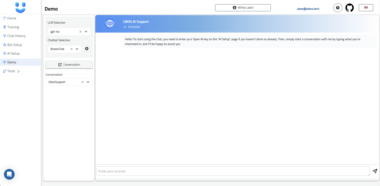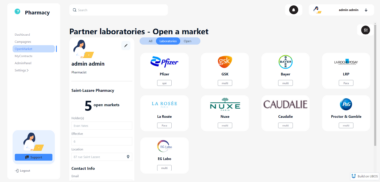Overview
In the rapidly evolving landscape of AI and machine learning, the UBOS MCP Server emerges as a pivotal tool for enterprises aiming to harness the power of Google’s Gemini model. This dedicated server wraps the @google/genai SDK, translating Gemini’s advanced capabilities into standard MCP tools. This allows other LLMs, such as Cline, or any MCP-compatible systems, to leverage Gemini’s robust features as a backend powerhouse.
Use Cases
Enterprise AI Integration: Businesses can integrate the MCP Server to streamline AI-driven operations, enhancing decision-making and productivity with real-time data processing.
Conversational AI Development: Developers can create sophisticated chatbots and virtual assistants that maintain conversational context across multiple interactions, thanks to the server’s stateful chat management.
Function Execution Automation: Enterprises can automate complex workflows by enabling Gemini models to execute client-defined functions, reducing manual intervention and errors.
Content Generation and Management: Leverage the server’s core generation capabilities for creating dynamic content, managing document workflows, and enhancing content personalization.
Key Features
- Core Generation: Offers both standard and streaming text generation, facilitating flexible content creation.
- Function Calling: Empowers models to request the execution of specific functions, streamlining automation.
- Stateful Chat: Maintains conversational context, enabling seamless, multi-turn interactions.
- File Handling: Supports file uploads, retrieval, and management using the Gemini API, essential for document-heavy workflows.
- Caching: Optimizes prompt responses by managing cached content, enhancing response times and efficiency.
UBOS Platform Integration
The UBOS platform stands at the forefront of AI innovation, providing a full-stack AI Agent Development Platform. It is designed to bring AI Agents to every business department, orchestrating AI Agents and connecting them with enterprise data. UBOS allows businesses to build custom AI Agents with their LLM models and Multi-Agent Systems, ensuring that AI is not just an add-on but a core component of business strategy.
Prerequisites and Setup
To deploy the MCP Server, users need Node.js (v18 or later) and an API Key from Google AI Studio. The server’s installation is straightforward, with options for automatic setup via Smithery or manual installation by cloning the project.
Installation Highlights
- Automatic Installation: Use Smithery for seamless integration with Claude Desktop.
- Manual Setup: Clone the project, install dependencies, and build the project for custom configurations.
The MCP Server is designed to simplify integration with Gemini models, providing a consistent, tool-based interface managed via the MCP standard. This ensures that businesses can focus on leveraging AI capabilities without the overhead of complex integration processes.
In conclusion, the UBOS MCP Server is not just a tool but a strategic enabler for businesses looking to integrate advanced AI capabilities into their operations. By providing a standardized interface to the powerful Gemini model, it opens up new possibilities for automation, content management, and conversational AI development.
Gemini Server
Project Details
- bsmi021/mcp-gemini-server
- MIT License
- Last Updated: 4/13/2025
Recomended MCP Servers
DiffuGen is a powerful yet user-friendly interface for localedge image generation. Built on the Model Control Protocol (MCP),...
A unified Model Context Protocol server implementation that aggregates multiple MCP servers into one.
Official Vectorize MCP Server
VSCode Extension with an MCP server that exposes semantic tools like Find Usages and Rename to LLMs
A Model Context Protocol (MCP) server that provides Trivy security scanning capabilities through a standardized interface.


A dynamic MCP server that allows AI to create and execute custom tools through a meta-function architecture

Chain of Draft (CoD) MCP Server: An MCP server implementation of the Chain of Draft reasoning approach for...
 From vibe coding to vibe deployment. UBOS MCP turns ideas into infra with one message.
From vibe coding to vibe deployment. UBOS MCP turns ideas into infra with one message.






